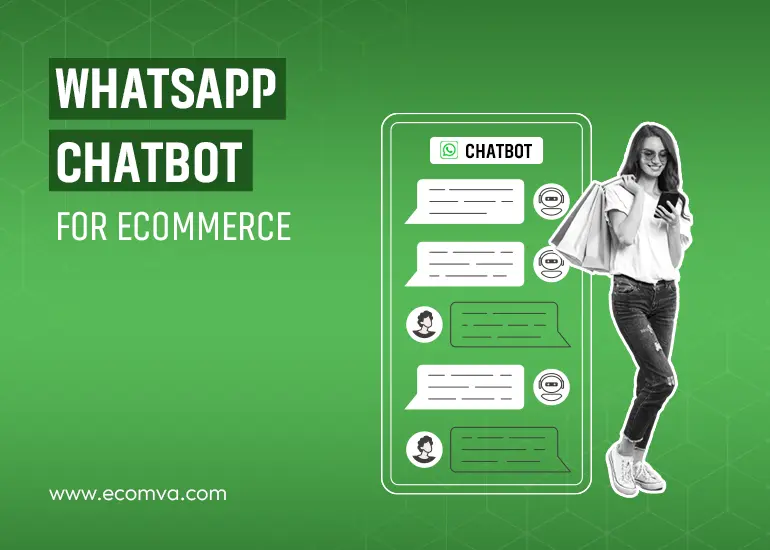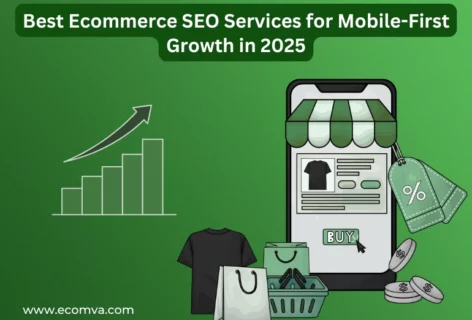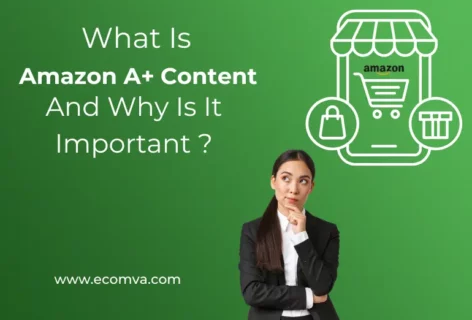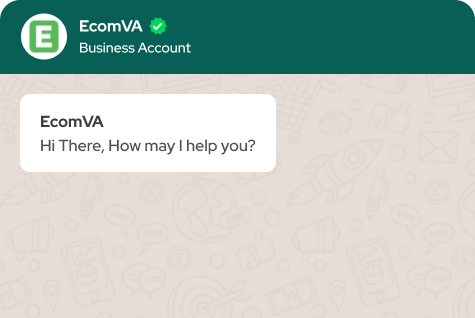WhatsApp Chatbot for Ecommerce: Transforming Customer Engagement

Imagine a world where your E-commerce store never sleeps, where every customer inquiry is answered instantly, and where personalized shopping experiences are just a message away. This isn’t a futuristic dream—it’s the reality that WhatsApp Chatbot bring to the table. In the present times where customers demand immediate responses and seamless interactions, staying ahead of the competition requires more than just a great product. With WhatsApp boasting over 2 billion active users globally, it’s no surprise that businesses leveraging this platform are seeing significant increases in customer engagement and sales.
Recent studies show that companies using WhatsApp AI Chatbots have experienced up to a 40% increase in customer interaction rates, alongside a 25% spike in sales conversions. Are you ready to explore how a WhatsApp Chatbot could revolutionize your E-commerce business? Let’s get started:
Understanding WhatsApp Business API
The WhatsApp Business API serves as a critical tool for businesses who are planning to automate customer interactions especially on a large scale. Unlike the standard WhatsApp Business app, which is typically designed for small businesses, the API lets larger enterprises integrate WhatsApp with their prevailing customer management systems. So, with the aid of WhatsApp API integration, businesses are able to craft sophisticated Chatbots that can effectively handle everything. It includes addressing FAQs or frequently asked questions to processing orders.
WhatsApp AI Chatbots that are mainly built on the API can comprehend as well as respond to customer queries in natural language. Thereby, it helps in making interactions feel more human-like. Not only that, but the API is also known for supporting multimedia messaging that lets businesses send videos, images and documents. All of these help in boosting the customer experience.
Code Snippet: Basic WhatsApp API Integration Example
python
Copy code
import requests
def send_whatsapp_message(phone_number, message):
url = “https://api.whatsapp.com/send”
payload = {
‘phone’: phone_number,
‘text’: message
}
headers = {
‘Authorization’: ‘Bearer YOUR_API_KEY’
}
response = requests.post(url, json=payload, headers=headers)
return response.json()
# Example Usage
response = send_whatsapp_message(‘+1234567890’, ‘Your order has been shipped!’)
print(response)
What Are the Essential Components of a Successful WhatsApp Chatbot?
Developing an effective WhatsApp Business Chatbot is not just about setting it up. It is about making sure that it functions smoothly and adds value to your business. Below are discussed the most important components of a thriving WhatsApp Chatbot:
Natural Language Processing (NLP)
Natural Language Processing or NLP generally lets your WhatsApp AI Chatbot to well comprehend and interpret customer queries in real language. Whether a customer is asking about product availability or shipping times, NLP helps in making sure that the Chatbot is always inclined towards offering accurate and context-aware responses.
Personalization
A WhatsApp Chatbot for business should essentially offer tailored recommendations that are typically based on past interactions and customer preferences. All of these ultimately result in higher conversion rates along with greater customer satisfaction levels.
Seamless Integration
For a WhatsApp Chatbot to be truly effective, it should effectively integrate with your existing CRM and inventory management systems. So, it typically lets the Chatbot access real-time data as well as offer customers accurate and updated information. All of these facilitates boosting their shopping experience.
User-Friendly Interface
A simple and intuitive interface is known for facilitating positive customer experience. Your WhatsApp Chatbot should guide users effortlessly all through their journey, whether they are exploring new products or tracking an order.
Security
With customer data at stake, security cannot be compromised. Implementing strong encryption and complying with data protection regulations are essential to maintaining customer trust and safeguarding sensitive information.
24/7 Availability
One of the standout benefits of WhatsApp Chatbots is their ability to provide round-the-clock support. So, it means that your customers can get the help they need, whenever they need it, leading to higher satisfaction and loyalty.
How Do WhatsApp Chatbots Benefit Your E-commerce Business?
Integrating a WhatsApp Chatbot into your E-commerce platform can offer you a large number of benefits. Some of these are as follows:
Facilitates Enhancing Customer Engagement
WhatsApp Chatbots are known for creating a direct and personal line of communication with particularly your customers. By leveraging advanced WhatsApp Chatbot technologies, you can send tailored offers, updates, and reminders that keep your audience engaged. Thus, this strategic use of a chatbot for customer engagement not only helps maintain interest but also increases the likelihood of customers making a purchase, ultimately boosting your sales.
Regarded as a Cost-Effective Solution
Automating customer service with WhatsApp Chatbots typically reduces the necessity for a large support team, which helps in saving your money. Not only that, but it also helps in increasing efficiency. Plus, Chatbots can simultaneously handle multiple queries, which makes sure that no customer is left waiting. By utilizing the WhatsApp Chatbot API, you can streamline these processes even further, making it a cost-effective solution for your business.
Helps in Improving Customer Satisfaction
Fast and accurate responses to customer inquiries helps in ensuring satisfaction. WhatsApp Chatbots excel at offering this, and with the added benefit of 24/7 availability, they ensure a consistently positive experience.
Facilitates Data Collection Process
WhatsApp Chatbots can gather valuable data on customer preferences and behavior. This information can then be used to refine your marketing strategies, personalize future interactions, along with improving product offerings.
Can Scale with Your Business
WhatsApp Chatbots are highly scalable, and able to handle increasing volumes of customer interactions as your business expands. So, it means that you would be able to maintain high service levels without needing to drastically increase your support team.
What Challenges Should You Consider When Implementing a WhatsApp Chatbot?
While the benefits are clear, now you may be thinking about what challenges you might face at the time of integrating a WhatsApp Chatbot into your E-commerce platform. Let’s find out in detail:
Complexity of Setup
The setup process of WhatsApp Chatbot can be technically challenging, especially whenever it comes to API integration. Also, it is tough to ensure that the Chatbot understands natural language. However, it is possible to mitigate all these challenges by establishing a partnership with experienced WhatsApp virtual assistants.
Maintaining Relevance
In order to stay relevant, your Chatbot necessitates frequent updates. It typically entails keeping product information, promotional offers, as well as FAQs current. If you overlook this aspect, then it could lead to outdated responses, which will end up frustrating customers.
Handling Complex Queries
While great for simple tasks, Chatbots may struggle with more complex inquiries. Ensuring a seamless transition to a human agent for these situations is crucial to maintaining a high level of customer service.
Customer Acceptance
Some customers may be hesitant to interact with Chatbots. To overcome this, your Chatbot should offer a smooth, human-like experience that builds trust and encourages engagement.
Privacy Concerns
Data privacy is a major concern for many customers. Ensuring your WhatsApp Chatbot complies with all relevant data protection laws is essential for maintaining customer trust and avoiding legal issues.
Wrapping Up
As Ecommerce continues to grow, the Features of WhatsApp Chatbots will only become more critical. These AI-powered tools offer a unique opportunity to enhance customer engagement, drive sales, and streamline operations. However, to fully capitalize on this technology, businesses must carefully consider the setup, maintenance, and potential challenges of implementing a WhatsApp Chatbot.
By addressing these factors, you can create a Chatbot that not only meets but exceeds customer expectations, positioning your E-commerce business for long-term success. In an industry where customer experience is everything, WhatsApp Chatbots offer a powerful way to stay ahead of the competition and connect with your audience in a meaningful way.










